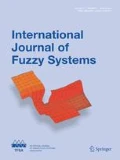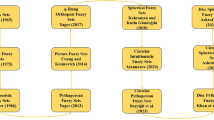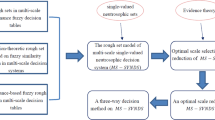Abstract
Multiple-criteria decision-making (MCDM) is an important branch of operations research which judges multiple criteria under decision-making environments. In the process of handling MCDM problems, because of the subjective judgment of human beings, it unavoidably involves a variety of uncertainties, like imprecision, fuzziness and incompleteness. The D numbers, as a reliable and effective expression of uncertain information, has a good performance to handle these types of uncertainties. However, there still are some spaces to be further researched. Therefore, a novel belief entropy-based method with regard to D numbers is proposed for MCDM problems. Finally, an application in the MCDM problem is illustrated to reveal the efficiency of the proposed method.



Similar content being viewed by others
References
Mardani, A., Jusoh, A., Zavadskas, E.K.: Fuzzy multiple criteria decision-making techniques and applications—two decades review from 1994 to 2014. Expert Syst. Appl. 42(8), 4126–4148 (2015)
He, Z., Jiang, W.: An evidential Markov decision making model. Inf. Sci. 467, 357–372 (2018)
Pedrycz, W., Al-Hmouz, R., Morfeq, A., Balamash, A.S.: Building granular fuzzy decision support systems. Knowl. Based Syst. 58, 3–10 (2014)
Seiti, H., Hafezalkotob, A., Fattahi, R.: Extending a pessimistic-optimistic fuzzy information axiom based approach considering acceptable risk: application in the selection of maintenance strategy. Appl. Soft Comput. 67, 895–909 (2018)
Dadelo, S., Turskis, Z., Zavadskas, E.K., Dadeliene, R.: Multi-criteria assessment and ranking system of sport team formation based on objective-measured values of criteria set. Expert Syst. Appl. 41(14), 6106–6113 (2014)
Jiang, W., Wei, B., Liu, X., Li, X., Zheng, H.: Intuitionistic fuzzy evidential power aggregation operator and its application in multiple criteria decision-making. Int. J. Syst. Sci. 49, 582–594 (2018)
Kang, B., Deng, Y., Hewage, K., Sadiq, R.: Generating Z-number based on OWA weights using maximum entropy. Int. J. Intell. Syst. 33(8), 1745–1755 (2018)
Zavadskas, E.K., Mardani, A., Turskis, Z., Jusoh, A., Nor, K.M.: Development of TOPSIS method to solve complicated decision-making problems: An overview on developments from 2000 to 2015. Int. J. Inf. Technol. Decis. Mak. 15(03), 645–682 (2016)
Lolli, F., Ishizaka, A., Gamberini, R., Rimini, B., Messori, M.: FlowSort-GDSS-A novel group multi-criteria decision support system for sorting problems with application to FMEA. Expert Syst. Appl. 42(17), 6342–6349 (2015)
Evans, J.P., Steuer, R.E.: A revised simplex method for linear multiple objective programs. Math. Program. 5(1), 54–72 (1973)
Yu, P., Zeleny, M.: The set of all nondominated solutions in linear cases and a multicriteria simplex method. J. Math. Anal. Appl. 49(2), 430–468 (1975)
Keeney, R.L., Raiffa, H.: Decisions with Multiple Objectives: Preferences and Value Trade-Offs. Cambridge University Press, Cambridge (1993)
Liu, H.-C., You, J.-X., You, X.-Y., Shan, M.-M.: A novel approach for failure mode and effects analysis using combination weighting and fuzzy VIKOR method. Appl. Soft Comput. 28, 579–588 (2015)
Zhang, W., Deng, Y.: Combining conflicting evidence using the DEMATEL method. Soft Comput. (2018). https://doi.org/10.1007/s00500-018-3455-8
Han, Y., Deng, Y.: An enhanced fuzzy evidential DEMATEL method with its application to identify critical success factors. Soft Comput. 22(15), 5073–5090 (2018)
Zhou, X., Hu, Y., Deng, Y., Chan, F.T.S., Ishizaka, A.: A DEMATEL-based completion method for incomplete pairwise comparison matrix in AHP. Ann. Oper. Res. 271(2), 1045–1066 (2018). https://doi.org/10.1007/s10479-018-2769-3
Su, S.-F., Chen, M.-C., Hsueh, Y.-C.: A novel fuzzy modeling structure-decomposed fuzzy system. IEEE Trans. Syst. Man Cybern. Syst. 47(8), 2311–2317 (2017)
Wang, N., Sun, Z., Su, S.-F., Wang, Y.: Fuzzy uncertainty observer-based path-following control of underactuated marine vehicles with unmodeled dynamics and disturbances. Int. J. Fuzzy Syst. 20(8), 2593–2604 (2018)
Kang, B., Deng, Y., Hewage, K., Sadiq, R.: A method of measuring uncertainty for Z-number. IEEE Trans. Fuzzy Syst. (2018). https://doi.org/10.1109/TFUZZ.2018.2868496
Fei, L., Deng, Y., Hu, Y.: DS-VIKOR: a new multi-criteria decision-making method for supplier selection. Int. J. Fuzzy Syst. (2018). https://doi.org/10.1007/s40815-018-0543-y
Deng, X., Jiang, W.: Dependence assessment in human reliability analysis using an evidential network approach extended by belief rules and uncertainty measures. Ann. Nucl. Energy 117, 183–193 (2018)
Su, X., Mahadevan, S., Xu, P., Deng, Y.: Dependence assessment in human reliability analysis using evidence theory and AHP. Risk Anal. 35(7), 1296–1316 (2015)
Zavadskas, E.K., Turskis, Z., Bagočius, V.: Multi-criteria selection of a deep-water port in the Eastern Baltic Sea. Appl. Soft Comput. 26, 180–192 (2015)
Fu, C., Xu, D.-L.: Determining attribute weights to improve solution reliability and its application to selecting leading industries. Ann. Oper. Res. 245, 401–426 (2014)
Han, Y., Deng, Y.: A hybrid intelligent model for assessment of critical success factors in high risk emergency system. J. Ambient Intell. Humaniz. Comput. 9(6), 1933–1953 (2018)
Su, S.-F., Hsueh, Y.-C., Tseng, C.-P., Chen, S.-S., Lin, Y.-S.: Direct adaptive fuzzy sliding mode control for under-actuated uncertain systems. Int. J. Fuzzy Log. Intell. Syst. 15(4), 240–250 (2015)
Wang, N., Su, S.-F., Yin, J., Zheng, Z., Er, M.J.: Global asymptotic model-free trajectory-independent tracking control of an uncertain marine vehicle: an adaptive universe-based fuzzy control approach. IEEE Trans. Fuzzy Syst. 26(3), 1613–1625 (2018)
Deng, Y.: D numbers: Theory and applications. J. Inf. Comput. Sci. 9(9), 2421–2421 (2012)
Deng, X., Deng, Y.: D-AHP method with different credibility of information. Soft Comput. (2018). https://doi.org/10.1007/s00500-017-2993-9
Mo, H., Deng, Y.: A new MADA methodology based on D numbers. Int. J. Fuzzy Syst. 20(8), 2458–2469 (2018)
Wang, N., Liu, F., Wei, D.: A modified combination rule for D numbers theory. Math. Probl. Eng. 2016, 1–10 (2016)
Rikhtegar, N., Mansouri, N., Ahadi Oroumieh, A., Yazdani-Chamzini, A., Kazimieras Zavadskas, E., Kildienė, S.: Environmental impact assessment based on group decision-making methods in mining projects. Econ. Res./Ekon. Istraž. 27(1), 378–392 (2014)
Liu, H.-C., You, J.-X., Fan, X.-J., Lin, Q.-L.: Failure mode and effects analysis using D numbers and grey relational projection method. Expert Syst. Appl. 41(10), 4670–4679 (2014)
Xiao, F.: An intelligent complex event processing with D numbers under fuzzy environment. Math. Probl. Eng. 2016, 1–10 (2016)
Sun, L., Liu, Y., Zhang, B., Shang, Y., Yuan, H., Ma, Z.: An integrated decision-making model for transformer condition assessment using game theory and modified evidence combination extended by D numbers. Energies 9(9), 697 (2016)
Khechadoorian, V., Osanloo, M.: Mined land use selection using a modified version of TOPSIS method, that can handle uncertainty, by accepting inputs as D numbers. In: Proceedings of the Beijing International Symposium Land Reclamation and Ecological Restoration, pp. 625–633 (2014)
Zong, F., Wang, L.: Evaluation of university scientific research ability based on the output of sci-tech papers: a D-AHP approach. PLoS One 12(2), e0171437 (2017)
Xiao, F.: A novel multi-criteria decision making method for assessing health-care waste treatment technologies based on D numbers. Eng. Appl. Artif. Intell. 71(2018), 216–225 (2018)
Li, M., Hu, Y., Zhang, Q., Deng, Y.: A novel distance function of D numbers and its application in product engineering. Eng. Appl. Artif. Intell. 47, 61–67 (2016)
Dempster, A.P.: Upper and lower probabilities induced by a multivalued mapping. Ann. Math. Stat. 38(2), 325–339 (1967)
Shafer, G.: A mathematical theory of evidence. Technometrics 20(1), 242 (1978)
Yin, L., Deng, X., Deng, Y.: The negation of a basic probability assignment. IEEE Trans. Fuzzy Syst. (2018). https://doi.org/10.1109/TFUZZ.2018.2871756
Xiao, F.: An improved method for combining conflicting evidences based on the similarity measure and belief function entropy. Int. J. Fuzzy Syst. 20(4), 1256–1266 (2018)
Zhang, H., Deng, Y.: Engine fault diagnosis based on sensor data fusion considering information quality and evidence theory. Adv. Mech. Eng. (2018). https://doi.org/10.1177/1687814018809184
Pan, L., Deng, Y.: A new belief entropy to measure uncertainty of basic probability assignments based on belief function and plausibility function. Entropy 20(11), 842 (2018)
Song, Y., Wang, X., Zhu, J., Lei, L.: Sensor dynamic reliability evaluation based on evidence theory and intuitionistic fuzzy sets. Appl. Intell. 48, 3950–3962 (2018)
Liu, Z.-G., Pan, Q., Dezert, J., Martin, A.: Adaptive imputation of missing values for incomplete pattern classification. Pattern Recognit. 52, 85–95 (2016)
Li, M., Zhang, Q., Deng, Y.: Evidential identification of influential nodes in network of networks. Chaos Solitons Fractals 117, 283–296 (2018)
Deng, Y.: Deng entropy. Chaos Solitons Fractals 91, 549–553 (2016)
Shannon, C.E.: A mathematical theory of communication. ACM SIGMOBILE Mobile Comput. Commun. Rev. 5(1), 3–55 (2001)
Yin, L., Deng, Y.: Toward uncertainty of weighted networks: an entropy-based model. Phys. A Stat. Mech. Appl. 508, 176–186 (2018)
Xiao, F.: A hybrid fuzzy soft sets decision making method in medical diagnosis. IEEE Access 6, 25300–25312 (2018)
Li, Y., Deng, Y.: Generalized ordered propositions fusion based on belief entropy. Int. J. Comput. Commun. Control 13(5), 792–807 (2018)
Xiao, F.: Multi-sensor data fusion based on the belief divergence measure of evidences and the belief entropy. Inf. Fusion 46(2019), 23–32 (2019)
Yu, L., Lai, K.K.: A distance-based group decision-making methodology for multi-person multi-criteria emergency decision support. Decis. Support Syst. 51(2), 307–315 (2011)
Acknowledgements
The author greatly appreciates the reviews’ suggestions and the editor’s encouragement. This research is supported by the Chongqing Overseas Scholars Innovation Program (No. cx2018077).
Author information
Authors and Affiliations
Corresponding author
Ethics declarations
Conflict of interest
Author F. Xiao declares that she has no conflict of interest.
Rights and permissions
About this article
Cite this article
Xiao, F. A Multiple-Criteria Decision-Making Method Based on D Numbers and Belief Entropy. Int. J. Fuzzy Syst. 21, 1144–1153 (2019). https://doi.org/10.1007/s40815-019-00620-2
Received:
Revised:
Accepted:
Published:
Issue Date:
DOI: https://doi.org/10.1007/s40815-019-00620-2




